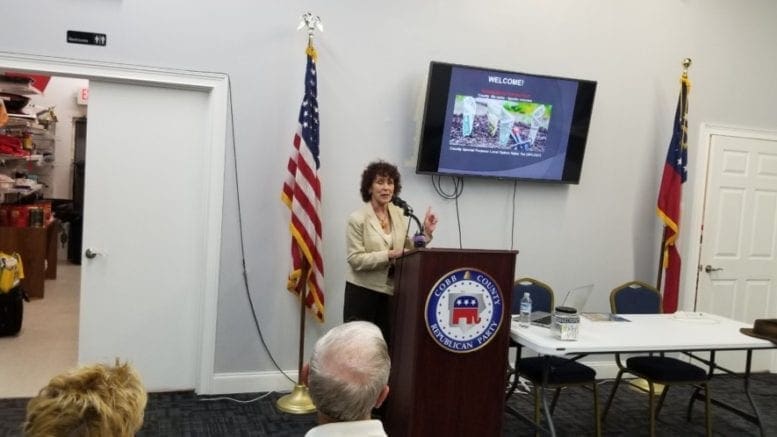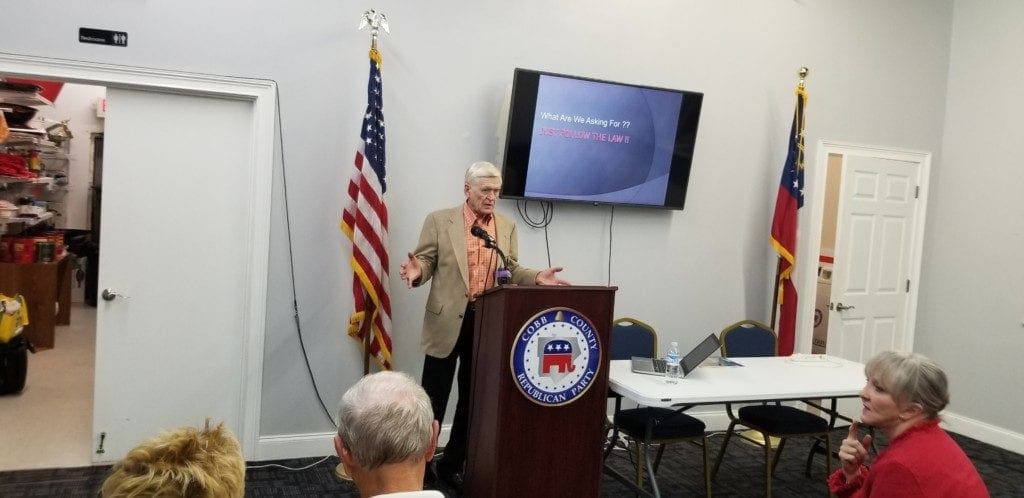A citizens group that has criticized the spending and accounting practices of the county’s Special Local Option Sales Tax (SPLOST) held a town hall meeting in the Cobb County Republican Party headquarters in Marietta Tuesday night. The speakers were activists Jan Barton, Debbie Fisher, and Larry Savage.
Barton told the Courier that the group had not formally chosen a name, but had used the name “Citizens for Accountability” informally.
Barton, who introduced the speakers, opened by saying, “Tonight we’re here to talk about your taxes: Special Local Option Sales Tax, or SPLOST, specifically. We’re talking about SPLOST as it relates to decisions by the Cobb County Board of Commissioners. We are not talking about the education SPLOST. That is a separate tax.”
“The SPLOST was enacted with good intentions,” she said, “but we are here tonight to talk about how those good intentions and Georgia laws related to SPLOST are being ignored and subverted.”
She said the SPLOST was supposed to be a temporary and special project tax.
“We will show ways in which it has led to wasteful spending. There is almost no SPLOST accountability. It is up to us to hold the government accountable.”
“SPLOST only pays for capital projects. It does not cover salaries, nor operating and maintenance costs, instead coming up with a finite list of critical projects. The county figures the total that can be collected, and infills with wishes and hopes and dreams of all these other projects.”
“Government is supposed to limit SPLOST spending to valid voter-approved projects,” she said.
She said potholes on all major Cobb roads is an indication there is no value to the SPLOST. “Or maybe it all went to sidewalks to nowhere,” she said.
Barton said that increases in revenue to the county makes proper reporting even more important now.
“We will show you that proper reporting has not been done,” she said. “Tonight we will not be discussing the pros and cons of SPLOST. We are here to show the multiple ways in which the county is not following Georgia laws and how the county could have avoided raising taxes.”
She said her group had spent about two years meeting with county officials and staff, and had not gotten a favorable response. The group hired former Georgia Senator Josh McKoon, and send a notice to the county of their intent to file an ad litem action against the county.
She said the next step of the group is to get public support in order to avoid filing an expensive lawsuit.
Debbie Fisher gave a slide presentation. One of the opening slides stated, “SPLOST: The Never Ending Slush Fund.”
“A very important thing that people don’t recognize when they’re looking at SPLOST, going to BOC meetings, a lot of those projects they ask for may or may not have been on the voter referendum, the project list that you voted for. I want to be clear, we’re not saying that we support or don’t support SPLOST.”
She said if SPLOST didn’t exist there would be more accountability because when the BOC creates a budget they have to account for every dollar, but, she said, that isn’t what happens with SPLOST.
“If you know the process that people go through to get their list: staff makes the recommendation, gives it to the BOC, the BOC says yes or no: ‘Oh, wait, no … I don’t want this, but I do want a library, I do want another fire station, I do want another Taj Mahal police station, and oh, by the way, we want steam rooms, saunas, showers, etc etc.'”
She said if SPLOST didn’t exist projects would be done only if they needed to be done. “We might get our potholes fixed, we might get our roads paved, because they would be held accountable.”
“And last but not least,” she said, “we would have tighter controls over where the money went, because Chairman Boyce has done more town halls than the last ten chairmans all put together. Why? Because he’s been out trying to sell tax ever since he walked into the office. And so he has done town halls saying ‘I can justify this expense, I can justify that expense, and if you don’t agree with me, I’m going to take away your libraries and charge the senior fee.'”
She said that the revenue from the three SPLOSTs amount to $2.2 billion, with very little oversight.
The options the citizen’s group have considered include requesting a grand jury or filing a lawsuit. She said it was unlikely the district attorney would take SPLOST spending to a grand jury and that a lawsuit would be expensive, so for now the group is appealing to “the court of public opinion” for support.
She said the group had sent two letters to the county attorney and Mike Boyce with their complaints about the use of SPLOST funds, and that the county denied any wrong-doing.
The group was particularly critical of the Bob Callan Trail, which Fisher called “the Taj Mahal of all trails.” She questioned the removal of the trail from the capital projects fund and its inclusion in the SPLOST. She said a segment of the trail was added to the 2005 SPLOST at the end of last year.
Fisher said funds were comingled between SPLOSTS, and between county and city projects.
“The reporting side of SPLOST truly becomes a guessing game,” she said. “What we have found is that DOT is completely not compliant with the law. We’ve complained, we’ve written emails, we’ve talked to the Attorney General, we have done just about everything we can, and everybody was like ‘Not my job’. And what we found is, for example: the Cobb school board, I can follow every penny they’ve spent. City of Marietta, I can follow every penny they’ve spent, the other cities: pretty good. DOT: no. Excess funds are not appropriately account for, they’re called about twenty different names.”
Fisher closed her talk with the following list of allegations about the county’s use of SPLOST:
- Project list requirements not followed
- Improper reporting
- Using excess funds as a slush fund
- Many projects are not special purpose
- Hit or miss operational expense budgeting
- Splosts go on and on and on
- Not using excess funds to pay down debt or reduce taxes
Larry Savage, who gave a presentation to the group on transportation, said “Just follow the law as it exists now, and things will pretty much fall into place. As she (Fisher) has pointed out, the cities seem to be able to do that, the school district is able to do that, and there’s really no explanation to be found for why the county is not able to do it as well.”
The county’s written response
County attorney Deborah Dance, in response to Joshua McKoon’s notice of intent to file legal action, wrote the following, excerpted from a January 18, 2019 email provided to us by the citizen’s group:
Dear Mr. McKoon,
Please accept this correspondence in further response to your notice to Chairman Boyce of citizens allegations against Cobb County for alleged failures to provide proper accounting for SPLOST revenues raised.
Based upon our review of those claims, we have concluded that Cobb County properly funded the projects identified in your correspondence with SPLOST funds because they were sufficiently identified SPLOST projects and that mandatory reporting required by the Georgia law has been satisfied.
Each of the projects was specifically identified or fit within a category approved by the electorate for each SPLOST. Thereafter, the approval for funding for each project was voted on in a public meeting by the Board of Commissioners after the funding request was submitted by staff to the Board of Commissioners for approval.
The county Finance Department prepares multiple SPLOST financial reports, including those required by statute, as well as those that may be requested by departments or the citizen oversight committee. Many have been provided to your identified clients. One required report is published in the newspaper each year.



Just a bunch of hot air from a group that’s opposed to any taxes and development in the county. SPLOST is a fairly well understood process and the county is in compliance with the requirements. The State AG has confirmed this for them already as well.
I actually dislike SPLOST. We should drop this and raise the property tax in a progressive manor so that a $500,000 McMansion pays a higher millage rate than someone in their modest home does.
The idea of a progressive millage rate is interesting, but I’m not sure how politically feasible it would be. Do you know of any place it’s been tried?
Ralph Miller, It seems you are a bit short on facts. We are NOT opposed to all taxes nor are we opposed to ALL development. What we are opposed to is irresponsible spending of our tax dollars and we want the County to follow the law. We clearly stated in our town hall that we neither support or oppose SPLOST. We have become addicted to SPLOST which has lost it’s original intent of SPECIAL PURPOSE projects. They are still spending money out of 2005 SPLOST. 14 years after the fact…You ok with that? We currently have 3 SPLOSTs we are spending from worth $2.2B and that doesn’t include the overage of $69 M in the 2016 SPLOST. If the county would have closed 2005 they had $25M available that could have paid down debt and / or lowered the millage rather than raise it by 1.7 Mils.
Ralph. Your childish name calling “hot air” comment is completely off the mark. If you had listened more carefully to the details, yes details of, and supporting documents for the allegations made by the SPLOST Group you would have all you need to understand the validity of said allegations. Learn more to be adequately informed!
Yes, although “SPLOST is a fairly well understood process,” it appears that the process is not sufficiently well understood by the COBB BOC. Since it is OUR money that the BOC are spending, full SPLOST accountability is required by the tax paying citizens of Cobb County.